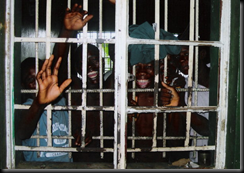 Fatmata Jalloh is raising her one-year old boy in an unconventional setting - from within the confines of the Makeni prison.
Fatmata Jalloh is raising her one-year old boy in an unconventional setting - from within the confines of the Makeni prison.
Jalloh, a young mother awaiting trial, has been behind bars since she was seven months pregnant. At the time she was arrested for theft.
Local police arrested her instead of her boyfriend, who managed to escape with his friend, who had stolen computers from Freetown. The computers were found in her home and Jalloh was the only person there - she was arrested for the crime and has been languishing in prison ever since.
"There are no witnesses, nobody has come forward to say I committed the crime," she said last week from her cell. "I wish to get out of here." Jalloh stays with her son and three other women in the female quarters of the prison. The women share one grey, open room and a courtyard, where they prepare food, braid each other's hair and play with Jalloh's son, Junior.
They have mosquito nets above their mattresses, which sit on the cement floor, and Jalloh said they are well looked after by prison officials.
Despite this, Jalloh said she would prefer to be raising her son in the free world.
Makeni prison, like most jails in the country, is overcrowded and small - unable to accommodate all the prisoners awaiting trial, especially male prisoners.
"I have 137 prisoners," said S.S. Koroma, prison-officer in charge of Makeni prison. "I'm supposed to have 80." He said in Makeni there are 40 prisoners awaiting trial, many of whom have been there for years, and only 72 prisoners have been convicted.
Koroma said many prisoners sleep on the floor because there are no mattresses. As well, there is not enough medicine or supplies for the extra men and his monthly supply of food and rice from the government always arrives late.
"The past government, they didn't pay us anything," he said. "The contractor was paid only Le 1,630 per person to feed them, which was meant to provide three meals a day." The government recommended 20 ounces of food per day, not nearly enough, said Koroma.
But Koroma said prisoners are mostly frustrated because they have not been indicted or charged.
Betty Alimamy Sesay, a Makeni radio journalist and activist, said the state of prisons and the justice system in the country is unacceptable.
"Many of them are in there and they shouldn't be," said Sesay, who is also a member of the Sierra Leone Court Monitoring Programme. "They are languishing in the prisons with no witnesses and their cases are not being heard." Sesay said there is one foreign judge in Makeni attempting to get innocent people out from behind bars, but she said the justice system in Makeni and the rest of the country is corrupt, slow and in need of restructuring.
She has been monitoring and attempting to expedite many of the Makeni cases, including Jalloh's. "I've been watching her case for awhile, ever since she came in here pregnant," said Sesay.
Another case Sesay has taken interest in is Abu Marrah's, a lance corporal from the military who has been behind bars in Makeni since 2002.
Marrah was arrested for an alleged murder in Kono, taken into Freetown where he appeared at the high court for six months and, because of lack of witnesses, eventually transferred to Makeni, where he still waits.
"I've appeared three times in court in Makeni," said Sesay, from the men's prison yard in Makeni. "The judge said the police aren't allowed to take me to court until they have a witness, but in the meantime I am stuck here." Several men gathered around Sesay, nodding in agreement. Some washed their clothes and hung them on a clothesline; others crouched in corners of the small prison yard, away from the sun. Many of their cases are similar - many of them have sat in prison for months or years because the police or justice systems do not have adequate resources or training.
Dauda Kamara, the new Minister of Internal Affairs, agreed with Sesay and said although he has not yet had time to visit the prisons, he knows they are in a sorry state.
"I am told that Pademba Road Prison in Freetown has 1084 prisoners, but there is only room for 300," said Kamara. "There is serious overcrowding and it is not tolerable conditions." Kamara blamed the overcrowding on the judiciary, who he said are slow and often not available to try cases - resulting in hundreds of prisoners awaiting trial throughout the country.
Relevant Links
West Africa
Legal and Judicial Affairs
Sierra Leone
"Everybody wants reform, reform, reform," he said, "I agree, but let us use effectively what we have now.
It is a problem of getting them to do their work at all." On Tuesday, Sierra Leonean Justice George Gelaga King delivered a scathing address to the Sierra Leone Bar Association in which he labeled the judiciary 'corrupt' and 'disrupting'.
Kamara said the prisons will not improve until the judges do. "It is a terrible situation," he said. .
allAfrica.com: Sierra Leone: Overcrowded Jails Filled With Prisoners Awaiting Trial (Page 1 of 1)
Though they are facing all sorts of criticism from fans, players and stakeholders back at home, the two referees that represented Sierra Leone in the just concluded Zone II tournament in Bissau were named to be two of the best in the competition.

